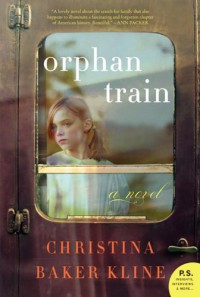
Interesting Piece of History, Not so Much Interesting Piece of Fiction

This is more of a 2.6 rating.
Christina Baker Kline's Orphan Train is a very popular book. It's running rampant among book clubs, in fact, it was chosen for my book club, and women have been very favorable towards it, in fact, it was chosen for my women authors book club. However, sadly to say, Orphan Train did not live up to all of its hype.
The story is split between two different narratives and two different time periods all connected by one character: Vivian Daly. That's her name in 2011. As a wealthy 90 year old living in Maine, she forms a friendship with Molly, a sort of troubled 17 year old girl. The second time period covers from 1929-1943. Vivian starts off as Niahm, an Irish immigrant who shortly loses her family in a fire after coming to New York. An orphan, she winds up on the enponymous train and lands in three homes where she is bestowed the name Dorothy and finally, Vivian.
In an interview with Roxana Robinson, Kline states "Too often, when I'm reading novels with separate storylines, I find that I prefer one over the other and am impatient to return to the ones I like. I tried to avoid this with Orphan Train by weaving the stories together so that they contained echoes of, and references to, each other..." On the positive side, Kline does interweave her narratives together quite nicely and I do believe spends an equal amount of time with each. However, she failed with making them equally as compelling and engaging.
The periods from 1929-1943 are the best. I never wanted to stop reading it. Vivian's ordeal with her deeply flawed Irish family, to her experiences on the train, to her tragedies and triumphs with each foster home was really captivating. I felt her loneliness and sense of abandoment. The only real part I enjoyed about the 2011 period was Vivian herself. I enjoyed that Vivian was not a bitter crumudgeon and I would be forced to roll my eyes every time she spoke. I had enough of that with Molly, who, speaking of which, was boring and as dull as a piece of plywood. I felt no sense of empathy toward her or her issues.
I also felt that Kline's sweeping generalizations about midwesterners was horrible. That Dina character was so grating and not genuine that she was a stereotypical caricature. That little gem of saying mildly racist things about Molly's Indian roots or Jack's Dominican parentage was pretty awful. Also, I felt Kline rushed the ending. It was a nice slow build up and in those last 15 pages, it was like bang, bang, bang. Then, it was such a happy ending. I get that the entire novel had an almost fairy tale quality to it but the ending was saccharine.
I will give kudos to Christina Baker Kline for educating me about a piece of history unknown to me. I had qualms about reading this book, serious qualms. However, learning this Orphan Train movement that occured in New York between 1854-1929 was extremely enlightening. Honestly, this was a crude precursor to our updated foster child system. Many improvements have been made but still a work in progress.
 1
1
